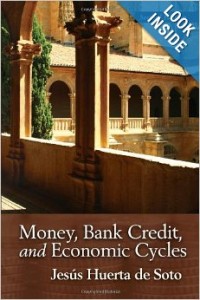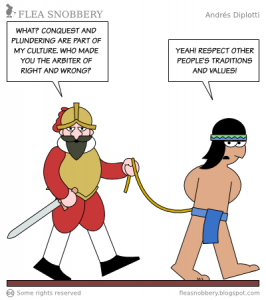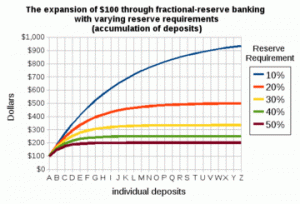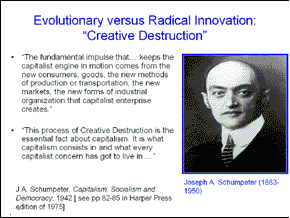
Jesus Huerta de Soto
In Hernando de Soto’s fantastic book Money, Bank Credit, and Economic Cycles, he uses a simple example from Robinson Crusoe to explain how savings is essential for the free enterprise process. Understanding these concepts at the simplest levels helps one decipher the more complicated cases in today’s modern economies. I have spent the last year really studying the fractional reserve banking (FRB) methods and now realize the highly inflationary nature of this process.
Unfortunately, the modern State’s marriage to the banking system has only exacerbated the ill effects of FRB by juicing the whole process with fiat money created through the central banks. Thus, the money supply grows precipitously during the Boom process and banks enjoy massive profits until the borrowers (both business and consumers) realize their inability to repay the debts at the now inflated prices cause the the monetary expansion. Of course, this leads to the Bust when debt defaults rapidly reverse the FRB monetary expansion.
LIFE Leadership is just months away from releasing my new book And Justice for All that reveals the SDS and FLD and how they interact within society. Increasingly, entrepreneurs are failing because they can no longer make accurate predictions based upon current prices thanks to the Boom/Bust FRB cycles. With that said, however, I am not a doom and gloom person as I believe the truth sets you free. It’s time for We the People to learn, live, and apply truth in the areas of finances (both personally, professionally, and societally) and restore the American (along with every other societies) Dream for the next-generation.
Here is part I of a two part series.
Sincerely,
Orrin Woodward
The sine qua non for producing capital goods is saving, or the relinquishment or postponement of immediate consumption. Indeed in an action process the actor will only be able to reach successive and increasingly time-consuming intermediate stages if he has first sacrificed the chance to undertake actions which would produce a more immediate result. In other words, he must give up the achievement of immediate ends which would satisfy current human needs (consumption).
To illustrate this important concept, we will use the example given by Böhm-Bawerk to explain the process of saving and investment in capital goods carried out by an individual actor in an isolated situation, such as Robinson Crusoe on his island. Let us suppose that Robinson Crusoe has just arrived on his island and spends his time picking berries by hand, his only means of subsistence. Each day he devotes all of his efforts to gathering berries, and he picks enough to survive and can even eat a few extra daily.
After several weeks on this diet, Robinson Crusoe makes the entrepreneurial discovery that with a wooden stick several meters long, he could reach higher and further, strike the bushes with force and gather the necessary berries much quicker. The only problem is that he estimates it could take him five whole days to find a suitable tree from which to take the stick and then to prepare it by pulling off its branches, leaves, and imperfections. During this time he will be compelled to interrupt his berry picking. If he wants to produce the stick, he will have to reduce his consumption of berries for a time and store the remainder in a basket until he has enough to survive for five days, the predicted duration of the production process of the wooden stick.
After planning his action, Robinson Crusoe decides to undertake it, and therefore he must first save a portion of the berries he picks by hand each day, reducing his consumption by that amount. This clearly means he must make an inevitable sacrifice, which he nevertheless deems well worth his effort in relation to the goal he longs to achieve. So he decides to reduce his consumption (in other words, to save) for several weeks while storing his leftover berries in a basket until he has accumulated an amount he believes will be sufficient to sustain him while he produces the stick. This example shows that each process of investment in capital goods requires prior saving; that is, a decrease in consumption, which must fall below its potential level.
Once Robinson Crusoe has saved enough berries, he spends five days searching for a branch from which to make his wooden stick, separating it from the tree and perfecting it. What does he eat during the five days it takes him to prepare the stick, a production process which forces him to interrupt his daily harvest of berries? He simply consumes the berries he accumulated in the basket over the preceding several-week period during which he saved the necessary portion from his handpicked berries and experienced some hunger. In this way, if Robinson Crusoe’s calculations were correct, at the end of five days he will have the stick (a capital good), which represents an intermediate stage removed in time (by five days of saving) from the immediate processes of the berry production (by hand) which up to that point had occupied him.
With the finished stick Robinson Crusoe can reach places inaccessible to him by hand and strike the bushes with force, multiplying his production of berries by ten. As a result, from that point on his stick enables him to gather in one-tenth of a day the berries he needs to survive, and he can spend the rest of his time resting or pursuing subsequent goals that are much more important to him (like building a hut or hunting animals to vary his diet and make clothes).















